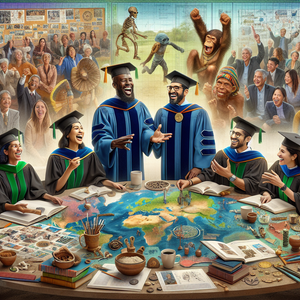
Exploring 20 Exciting Career Paths for Anthropology Graduates: Skills, Insights, and Opportunities
Graduating with a degree in anthropology opens up a world of possibilities that go well beyond the confines of traditional academic roles. In today’s dynamic job market, anthropology graduates are increasingly valued in diverse sectors, including government, non-profits, corporate environments, and cultural institutions. Their training equips them with a unique set of skills—ranging from cultural sensitivity to analytical thinking—that can significantly impact various fields. In this comprehensive exploration, we will delve into 20 intriguing career paths for anthropology graduates, highlighting the essential insights and skills that make them desirable candidates in today’s workforce.
Job Summaries:
Cultural Anthropologist:
- Cultural anthropologists explore the rich tapestry of human cultures.
- They investigate social practices and community values.
- Through immersive fieldwork and qualitative research methods, they collect valuable data.
- This data informs policy development and program design.
- Advanced degrees, typically at the master's or doctoral level, are essential for this role.
- A deep understanding of cultural nuances is also important.
Archaeologist:
- Archaeologists bring history to life by excavating and analyzing artifacts from previous civilizations.
- They work across various settings, from universities to government agencies.
- They must possess a strong foundation in anthropology or archaeology.
- Their work not only preserves cultural heritage but also enriches our understanding of human evolution and societal development.
Museum Curator:
- As guardians of cultural heritage, museum curators manage collections and curate exhibitions that educate the public.
- A master's degree in museum studies, history, or anthropology is often necessary.
- Curators bridge the past and present, making history accessible and engaging for visitors.
Market Research Analyst:
- Market research analysts utilize anthropological insights to understand consumer behavior and market dynamics.
- With a bachelor’s degree in anthropology, marketing, or business, these professionals analyze data to help organizations strategize and improve their offerings, ensuring they resonate with diverse audiences.
Public Relations Manager:
- Public relations managers craft compelling narratives to enhance an organization's image.
- A background in anthropology offers a unique perspective on cultural communication, allowing them to navigate diverse audience needs effectively.
- A degree in public relations or communications is helpful in this role.
Nonprofit Program Manager:
- Nonprofit program managers design and oversee initiatives that address community needs.
- An anthropology degree equips them with the skills to assess social issues and implement effective solutions.
- This role is particularly rewarding for graduates dedicated to making a positive impact.
Policy Analyst:
- Policy analysts apply their research skills to evaluate and recommend improvements for policies affecting communities.
- With degrees in anthropology or public policy, they provide insights that help shape culturally informed decisions at governmental and organizational levels.
Environmental Anthropologist:
- Focusing on the interplay between human cultures and their environments.
- Environmental anthropologists study sustainability practices.
- They advocate for ecological preservation.
- Graduate-level education in anthropology and environmental science is often required for this impactful role.
Forensic Anthropologist:
- Forensic anthropologists play a critical role in criminal investigations by analyzing human skeletal remains.
- This specialized field requires a master's degree in anthropology with a focus on forensic methods.
- Merging science with law enforcement to achieve justice.
Cultural Resource Manager:
- Cultural resource managers are pivotal in preserving historical sites and artifacts.
- They ensure compliance with preservation laws.
- Their work often involves collaboration with government agencies or consulting firms.
- A background in anthropology or archaeology is necessary.
Diversity and Inclusion Officer:
- Diversity and inclusion officers leverage their understanding of cultural dynamics to create policies that promote inclusivity in the workplace.
- A degree in anthropology or human resources, combined with strong communication skills, is essential for success in this role.
Human Resources Specialist:
- In human resources, specialists focus on recruitment and employee relations.
- Specialists foster a positive organizational culture.
- An anthropology degree provides valuable insights into human behavior.
- Anthropology enhances workplace dynamics.
- Improves employee satisfaction.
Cultural Ambassador:
- Cultural ambassadors serve as vital links between communities.
- They promote understanding and collaboration.
- Their strong communication skills empower them to facilitate cross-cultural dialogues effectively.
- They possess anthropological knowledge.
Social Researcher:
- Designing studies to investigate social trends and issues
- Social researchers contribute valuable insights to policy decisions and community programs
- Typically requiring a degree in anthropology or sociology
- Their work plays a crucial role in shaping social initiatives.
Public Health Advisor:
- Focused on improving health outcomes
- Public health advisors analyze data
- Work with marginalized populations
- A degree in public health or anthropology equips them to address health disparities
- Advocate for vulnerable communities
Urban Planner:
- Urban planners develop land use strategies that balance social, economic, and environmental considerations.
- They have degrees in urban planning, geography, or anthropology.
- They apply their skills to create inclusive and sustainable urban environments.
Ethnographic Researcher:
- Ethnographic researchers conduct in-depth examinations of cultural practices and social behaviors.
- They use qualitative methods to gather rich insights.
- A degree in anthropology is vital for this role.
- This role helps organizations understand diverse perspectives.
Program Evaluator:
- Program evaluators assess the effectiveness of social programs.
- They ensure programs meet community needs.
- Their analytical skills are crucial for their role.
- A background in anthropology or social sciences is beneficial.
- They provide actionable recommendations.
Consumer Behavior Analyst:
- By studying purchasing patterns, consumer behavior analysts apply anthropological insights to discern cultural influences on buying decisions.
- A degree in marketing, psychology, or anthropology is typically required for this role.
Corporate Culture Consultant:
- Corporate culture consultants evaluate and enhance organizational culture.
- They promote employee engagement and productivity.
- A background in anthropology or organizational psychology is beneficial.
- These professionals apply cultural understandings to improve workplace dynamics.
These varied career paths highlight the diverse opportunities available to anthropology graduates, showcasing their unique skills and perspectives that can significantly impact various sectors. Whether aiming for lucrative positions in corporate environments or fulfilling roles in nonprofit organizations, an anthropology degree offers a foundation for meaningful and impactful careers. By understanding the value of anthropological insights, graduates can navigate and thrive in a multitude of professional landscapes.
Explore More Jobs

